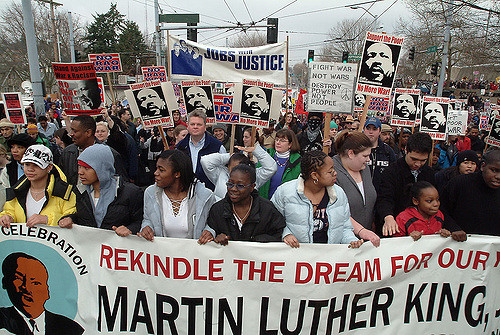On October 19, 1983, the Martin Luther King, Jr. Holiday Bill was sponsored by Senator Ted Kennedy (D.-Mass.) and passed the U.S. Senate by a vote of 78-22.
Two weeks later, on November 3, President Reagan signed the bill that established the 3rd Monday of every January as the Martin Luther King, Jr. National Holiday. It took effect in 1986, realizing the vision of the lengthy, dedicated campaign led by Coretta Scott King for the nation to pay lasting tribute to her husband’s extraordinary life and legacy.
 Yet even with this vaunted status as one of only 10 federal holidays, MLK Day is not treated with the proper respect it deserves. Millions of people clock in at their jobs. The UPS delivery person still comes to your door with Amazon packages. Bars and restaurants stay open. Civil life goes on, for the most part, as if nothing special is happening. People get haircuts, go to the movies, make grocery lists, and pick up their kids at sports practice. Sure, there are songfests, speeches, museum exhibits, television specials, and ribbon cuttings, but most Americans do not seem to be upholding or honoring Dr. King’s legacy.
Yet even with this vaunted status as one of only 10 federal holidays, MLK Day is not treated with the proper respect it deserves. Millions of people clock in at their jobs. The UPS delivery person still comes to your door with Amazon packages. Bars and restaurants stay open. Civil life goes on, for the most part, as if nothing special is happening. People get haircuts, go to the movies, make grocery lists, and pick up their kids at sports practice. Sure, there are songfests, speeches, museum exhibits, television specials, and ribbon cuttings, but most Americans do not seem to be upholding or honoring Dr. King’s legacy.
Regarding the closing of schools, if King had a say, he would have wanted our youth to stay in school. Make it a day about social justice, civil rights, and freedom for all. Make it a day about developing conflict resolution skills and learning how to become peacemakers. King would not want kids at home playing video games, on the couch watching TV, or in bedrooms talking on their cell phones.
As early as 1947, while King was attending Morehouse College in Atlanta, he was working out his philosophy of education. In the student newspaper, he wrote:
“It seems to me that education has a two-fold function to perform in the life of society: the one is utility and the other is culture. Education must enable a man (and woman) to become more efficient, to achieve with increasing facility the legitimate goals of their life … Education must also train one for quick, resolute and effective thinking. To think incisively and to think for one’s self is very difficult.We are prone to let our mental life become invaded by legions of half truths, prejudices, and propaganda.”
If MLK Day does not help youth to be educated in the way King describes, he would not want anything to do with this holiday. As a humble Baptist minister, he would be embarrassed by the idolization of his image and he would be disturbed by the co-opting of his theology. The only redeeming value he would find in this day of observance would be if millions of students learned more about peace skills. King would have detested the idea of a day off in his name to get errands done.
So, I have a proposal. Let’s truly implement the challenge to make this a day on rather than a day off. How can we do this? Here are some ideas.
Just as the federal government has the power to halt certain activities and services throughout the public sector, it also has the authority to mandate what type of activities and services can go on if organizations stay open. Let’s take King’s concept of the “Beloved Community” and institutionalize it.
We can do so much more than a day of community volunteering, which often is the way that people implement the “day on” message. We can make this a day of profound reconciliation and unification. Wardens can serve prisoners and, where appropriate, prisoners can serve victims and survivors. This day of reconciliation and courageous healing will place churchgoers in mosques and Muslims in synagogues; students will teach their professors, and professors will go outside the school walls to teach drop-outs; medical patients will be required to heal doctors with their stories and testimonies, and doctors will be expected to go beyond the hospital to heal those in the neighborhoods without insurance; police officers will partake in restorative justice programs, and perpetrators will be given opportunities to listen to the experiences of cops; and politicians will actually be positioned to work on problems with their constituents, as citizens of equality.
Let’s make MLK Day a secular yet sacred time of radical service and reconciliation, one that extends across all social borders. Let’s make it the most spiritual, contemplative, and progressive holiday on the calendar. Let’s do what Reverend King would have wanted: follow the teachings of the Gospels. If Jesus spoke any words for certain, it is these: “the last will be first, and the first last” (Matthew 20:16).







